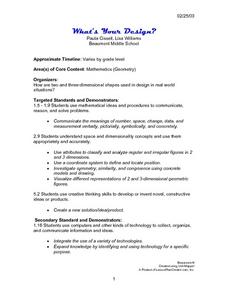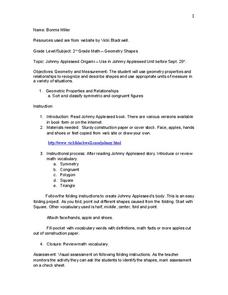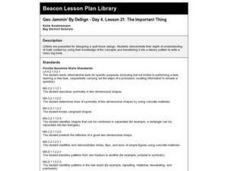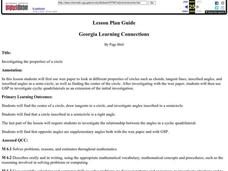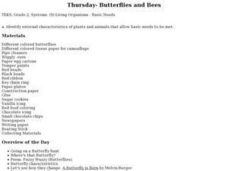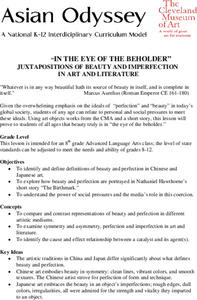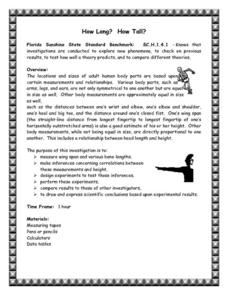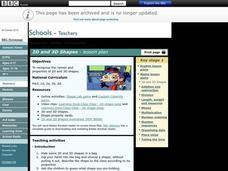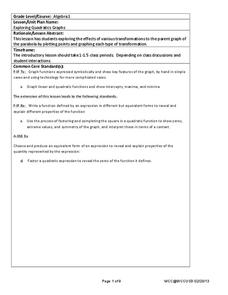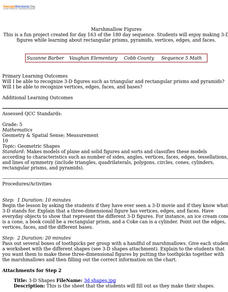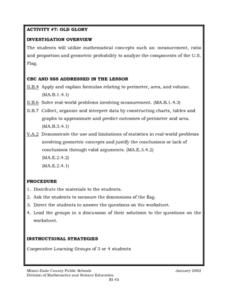Curated OER
Camping with a Triangular Prism and Its Net
Learners differentiate triangular prisms from other prisms using nets. In this geometry lesson, students define the properties of a triangular prism and its symmetry. They build a triangular prism moving lines around.
Curated OER
What's Your Design?
Sixth grade students: design a stained glass window, submitting their initial plan detailing the measurements of all lines and angles. Seventh grade students: create a scale drawing of their own geometric family of four members.
Curated OER
Further Differentiation
In this further differentiation instructional activity, students solve and complete 7 various types of problems. First, they sketch the graph of each equation using a stationary point. Then, students find the stationary points of each...
Curated OER
Johnny Appleseed Origami
Second graders make an origami Johnny Appleseed. For this geometry lesson students follow folding instructions. They find different geometric shapes while they are folding. They create Johnny Appleseed's body and attach a face and hands...
Curated OER
Comparing and Contrasting
Students practice compare and contrast skills. In this science and language development lesson, students complete a T chart generating traits of a snail and a clam. Students complete a related worksheet.
Curated OER
Governor's Garden
Students review types of polygons and list several examples of each. They assume the role of a landscape artist interviewing for a job. They create sketches of their plans for six polygonal gardens and write an expository paragraph...
Curated OER
Geo Jammin By Design: The Important Thing
Students brainstorm what they know about geometric terms and patterns. They identify symmetry, shapes and congruency. They create a book of symmetry.
Curated OER
Tessellation Quilt Squares
Fifth graders design a "quilt block" that has a tessellating pattern to help create a class tessellation quilt. They describe relationships between two- and three-dimensional shapes and analyze attributes and properties of geometric...
Curated OER
Investigating the properties of a circle
Students use wax paper to look at different properties of circles such as chords, tangent lines, inscribed angles, and inscribed angles in a semi-circle, as well as finding the center of the circle, and use GSP to investigate cyclic...
Curated OER
Biology: Butterfly Activities
Second graders examine various types of butterflies and insects around their school. They identify differences between beetles and butterflies. Students examine books about butterflies, complete symmetry drawings, and make ladybug key...
Curated OER
In The Eye Of The Beholder
Pupils identify and define definitions of beauty and perfection in Chinese and
Japanese art and compare those definitions to other cultural beliefs and societies. This lesson includes a two-part lesson evaluation.
Curated OER
Keeping Us in Stitches Activity: Whole Cloth Quilt Design
Students examine how decorative motifs are adapted to other types of objects by craftsmen and artists. They examine photos on the Illinois State Museum website, discuss design elements, adapt a motif to a line drawing, and transfer a...
Curated OER
How Long? How Tall?
Seventh graders investigate the parts of the human body and examine the symmetry of body parts like arms and legs. They measure the body parts and take individual height and weight to compare the quantities. Student examine whether the...
Curated OER
Milkweed and Monarch Butterfly Mania-True/False Quiz
For this milkweed and monarch butterfly worksheet, students complete a 9 question true/false quiz. Students may retrieve score on line.
Curated OER
2D and 3D Shapes
Have your class use online activities to recognize the names and properties of 2D and 3D shapes. They will listen to their teacher describe a mystery shape and try to guess it. Additionally they will watch clips online about a 2D shape...
Curated OER
Properties of a Parabola
For this algebra worksheet, students identify the properties of a parabola. They factor and graph quadratic equations. There are 18 questions.
Mathematics Vision Project
Module 6: Congruence, Construction, and Proof
Trace the links between a variety of math concepts in this far-reaching unit. Ideas that seem very different on the outset (like the distance formula and rigid transformations) come together in very natural and logical ways. This unit...
Willow Tree
Transformations
How does something go from here to there? Describe it with a transformation. Young mathematicians learn how to translate, reflect, rotate, and dilate an image.
Curated OER
Drawing to Scale
Students examine the process of drawing a picture to scale. They analyze and discuss real-life blueprints for a house, and create a scale drawing of an original invention using calculators and rulers.
West Contra Costa Unified School District
Exploring Quadratics and Graphs
Young mathematicians first graph a series of quadratic equations, and then investigate how various parts of the equation change the graph of the function in a predictable way.
Curated OER
Marshmallow Figures
Students enjoy making 3-D figures while learning about rectangular prisms, pyramids, vertices, edges, and faces. After a lecture/demo, students use marshmallows, toothpicks and a worksheet imbedded in this lesson to create 3 dimensional...
Curated OER
Design a Colonial Garden
Students explore botany by completing an art design activity in class. In this gardening history lesson, students identify the plants and crops utilized in the Colonial era for both food and medicine. Students utilize geometry to create...
Curated OER
Slides, Flips. Turns......It's All On A Memory Book Page
Fourth graders use tangram sets to investigate the congruence of shapes. They use congruent shapes to demonstrate the properties of slides, flips, and turns. They complete a math journal entry that describes and illustrates each concept.
Curated OER
Old Glory
Learners utilize mathematical concepts such as: measurement, ratio and proportion and geometric probability to analyze the components of the U.S. Flag. They collect, organize and interpret data by constructing charts, tables and graphs...



